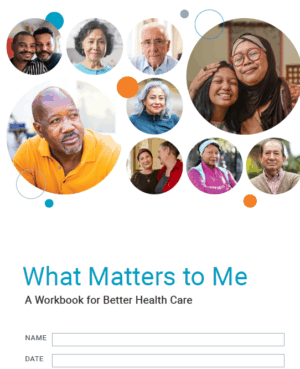Revising the What Matters to Me Workbook
In 2021, The Conversation Project and Ariadne Labs published the “What Matters to Me Workbook.” Our goal was to create a resource for patients with serious illness that would help them prepare to talk more effectively with their health professionals about their goals, values, and preferences.
Since its launch, the workbook has been used by 60,047 patients and clinicians and has gotten positive feedback for its accessibility and well-crafted language. But we also heard that the term “serious illness” could be an obstacle to patients and families, particularly for older people. So, we decided to take our four years of real-world learnings and see how we could make the tool even more effective for the people who need it.
Why did we change?
Clinician feedback
We wanted to make the workbook easier for health professionals to share with their patients. Clinicians who worked with people in their 80s and 90s told us that having “A Workbook for People with Serious Illness” on the cover — part of the tool’s original title — was a barrier for some patients. The workbook might have been really helpful, but because the patient did not identify as “seriously ill,” they didn’t think it was right for them.
The other thing we heard was that some of the questions were more challenging than others. One clinician suggested we split the workbook into two parts, with questions that apply to everyone in Part I, and questions that were more relevant to care through the end of life in Part II.
Patient and caregiver feedback
What sealed the deal for us was hearing from patients and family caregivers. The Workbook was originally based on the Serious Illness Conversation Guide, a clinician-facing tool to help health professionals talk to patients and their important people about the patient’s goals, values, and priorities. We’d recently revised the Guide based on feedback from a panel of Black, Latina, and Asian patients and caregivers in collaboration with the Patient Advocate Foundation, as well as input from the Ariadne Labs Serious Illness Community of Practice. Using these insights, we changed the language of the Guide to make it more accessible to people from diverse backgrounds. We realized these changes could make the Workbook more accessible, too.
What changed?
A few things!
Starting with the cover: Instead of “A Workbook for People with Serious Illness”, it now says “A Workbook for Better Health Care.” There were actually only two references to serious illness inside the Workbook, and we removed those as well.
Using more inclusive language: One of the biggest changes came from the revisions to the Serious Illness Conversation Guide. Previously, the Guide included the question: “What abilities are so critical to your life that you can’t imagine living without them?” We heard from a lot of people that this question could sound judgmental to people living with disabilities. Instead, the new question is, “What activities bring joy or meaning to your life?”
Centering hope: Patients and caregivers wanted the conversation more centered around hope. To try to ensure the conversation ended on a positive note, we added the question: “What are your hopes for your health?”
Using simpler and more positive wording: A lot of the changes were small, but designed to make the language less negative, less formal, and less complicated. For example:
- We removed the question: “If you become sicker, which matters more to you: the possibility of a longer life, or the possibility of a better quality of life?” We felt this question promoted a false narrative, that one has to choose either a longer life or a better quality of life, when in fact both can be possible.
- Instead of asking, “What is your understanding of your current health situation?”, the guide now asks, “What is your understanding of what’s happening with your health now?”
What’s next?
Our next project is to evolve the workbook content into a series of worksheets that health professionals and patients can do together. We hope these bite-size conversation pieces will make it even easier for everyone to talk about what’s important to them in their life and in their care.
Erik Fromme, MD, MCR, is a Senior Scientist with the Serious Illness Care Program at Ariadne Labs.


I really like the idea of revising the book’s wording. I think when patients hear certain words, like if they get worse or sick, they feel sad when you ask the question. Even on my SIC smartphrases, I change the wording in a similar way to how you have changed it. I can’t wait to share the book with the patients. Are you going to update the SIC guide as well?
Hi, I’m curious why the download is dated 2023. Was it updated now or two years ago?
Thanks!
How do I receive the updated booklet?
I love that language has a bit more of a microscope on it within the health realm now. This means people are becoming more mindful, selfless and intentional. The medical/health world is very foreign to westerners, especially certain populations, and like everything else unknown, can fill the viewer with fear. We are breaking down these walls and comfortably inviting people to learn and simultaneously shape our long time broken systems. This is art and living, thank you!